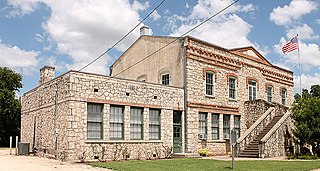See also
- Tamynae, a town of ancient Euboea
Tamina is an American professional wrestler.
Tamina may also refer to:
Norse is a demonym for Norsemen, a Medieval North Germanic ethnolinguistic group ancestral to modern Scandinavians, defined as speakers of Old Norse from about the 9th to the 13th centuries.

Castroville is a city in Medina County, Texas, United States. Its population was 2,954 at the 2020 census, up from 2,680 at the 2010 census. It is part of the San Antonio–New Braunfels, Texas Metropolitan Statistical Area. Prior to 1893, Castroville was the first county seat of Medina County. Castroville was founded by Alsatian-Texans, who came to Texas during the German emigration period of the mid-1800s. Most Alsatians who came to Castroville spoke Alsatian. The Alsatian culture and language are still kept alive by the residents of Castroville.
ERS, Ers or ers may refer to:
Southern American English or Southern U.S. English is a regional dialect or collection of dialects of American English spoken throughout the Southern United States, though concentrated increasingly in more rural areas, and spoken primarily by White Southerners. In terms of accent, its most innovative forms include southern varieties of Appalachian English and certain varieties of Texan English. Popularly known in the United States as a Southern accent or simply Southern, Southern American English now comprises the largest American regional accent group by number of speakers. Formal, much more recent terms within American linguistics include "Southern White Vernacular English" and "Rural White Southern English".
Gail may refer to:

Chicano English, or Mexican-American English, is a dialect of American English spoken primarily by Mexican Americans, particularly in the Southwestern United States ranging from Texas to California, as well as in Chicago. Chicano English is sometimes mistakenly conflated with Spanglish, which is a mixing of Spanish and English; however, Chicano English is a fully formed and native dialect of English, not a "learner English" or interlanguage. It is even the native dialect of some speakers who know little to no Spanish, or have no Mexican heritage.
Innu-aimun or Montagnais is an Algonquian language spoken by over 10,000 Innu in Labrador and Quebec in Eastern Canada. It is a member of the Cree–Montagnais–Naskapi dialect continuum and is spoken in various dialects depending on the community.
Of the languages spoken in Texas, none has been designated the official language. As of 2020, 64.9% of residents spoke only English at home, while 28.8% spoke Spanish at home. Throughout the history of Texas, English and Spanish have at one time or another been the primary dominant language used by government officials, with German recognized as a minority language from statehood until the first World War. Prior to European colonization, several indigenous languages were spoken in what is now Texas, including Caddoan, Na-Dené and Uto-Aztecan languages.

The Tamina is a river in the south of the canton of St. Gallen in Switzerland, running close to the border to the canton of Grisons. It has a length of almost 29 km (18 mi), flowing through the Tamina Valley, of which Tamina Gorge is an impressiv part, before it enters the Rhine as a left tributary.

Texas Germans are descendants of Germans who settled in Texas since the 1830s. The arriving Germans tended to cluster in ethnic enclaves; the majority settled in a broad, fragmented belt across the south-central part of the state, where many became farmers. As of 1990, about three million Texans considered themselves German in ancestry.

Tamina is an unincorporated community in southern Montgomery County, Texas, United States.

Midland American English is a regional dialect or super-dialect of American English, geographically lying between the traditionally-defined Northern and Southern United States. The boundaries of Midland American English are not entirely clear, being revised and reduced by linguists due to definitional changes and several Midland sub-regions undergoing rapid and diverging pronunciation shifts since the early-middle 20th century onwards.
Hercules is a Radical Comics character who has appeared in two limited series, The Thracian Wars and The Knives of Kush, both written by Steve Moore with Cris Bolsin as the artist. The Jim Steranko "Hercules" from the cover of the first issue is also featured in solid bronze as the first in the Radical Toyz product line. Radical Toyz commissioned sculptor Chris Ingram to bring to life the art that represents Radical's flagship title
Texan English is the array of American English dialects spoken in Texas, primarily falling under Southern U.S. English. As one nationwide study states, the typical Texan accent is a "Southern accent with a twist". The "twist" refers to inland Southern U.S., older coastal Southern U.S., and South Midland U.S. accents mixing together, due to Texas's settlement history, as well as some lexical (vocabulary) influences from Mexican Spanish. In fact, there is no single accent that covers all of Texas and few dialect features are unique to Texas alone. The newest and most innovative Southern U.S. accent features are best reported in Lubbock, Odessa, somewhat Houston and variably Dallas, though general features of this same dialect are found throughout the state, with several exceptions: Abilene and somewhat Austin, Corpus Christi, and El Paso appear to align more with Midland U.S. accents than Southern ones.
Laha is a Kra language spoken by approximately 1,400 people out of a total population of 5,686 Laha. It is spoken in Lào Cai and Sơn La provinces, Vietnam. Laha dialects had been documented in 1986 by Russian linguists and in 1996 by American linguist Jerold A. Edmondson. Many Laha can also converse in the Khmu language, and Laha-speaking areas also have significant Black Thai, Kháng, Ksongmul, and Hmong populations.

Sarona Moana Marie Reiher Snuka-Polamalu is an American professional wrestler better known by her ring name Tamina. She is currently signed to WWE. She is a second generation professional wrestler, the daughter of Jimmy Snuka.
Zangskari dialect is an endangered Tibetic language. It is a dialect of Ladakhi language. It is mostly spoken in the Zanskar region of the Kargil district of Ladakh, India and also by Buddhists in the upper reaches of Lahaul, Himachal Pradesh, and Paddar, Jammu and Kashmir. It is written using the Tibetan script.
The Okinoerabu dialect cluster, also Oki-no-Erabu, is a dialect cluster spoken on Okinoerabu Island, Kagoshima Prefecture of southwestern Japan. It is part of the Amami–Okinawan languages, which are part of the Japonic languages.

Team B.A.D. was an American professional wrestling stable that performed in WWE, consisting of Naomi, Tamina and Sasha Banks.

Sabine River Spanish is a variety of the Spanish language spoken on both sides of the Sabine River between Texas and Louisiana. It has been spoken by a few communities descended from the 18th-century colonists who established Los Adaes and Nacogdoches. Due to its historical origins, it has a mostly conservative phonology with a vocabulary derived from rural Mexican Spanish. It is facing language death as it has not been passed onto children for several generations.